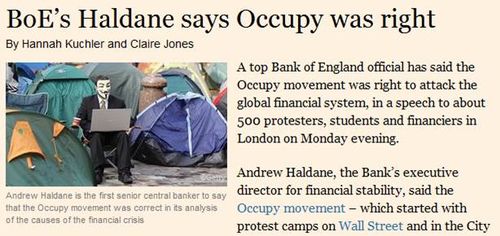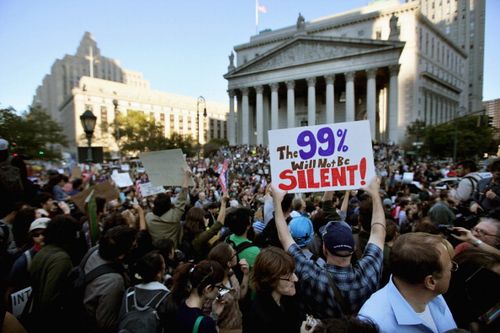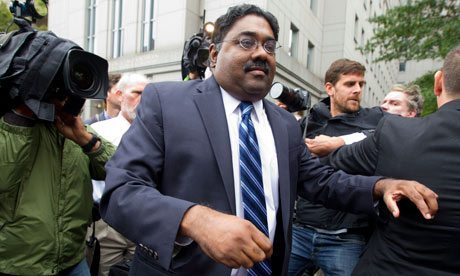
Following on from my previous two polemics:
I’m now moving on to the final contentious point which is that capitalism is
dead.
We all knew that capitalism died in 2008 when the crisis
hit, or at least the Anglo-Saxon version of capitalism that was all based upon
selfish greed.
The self-serving focus of modern society was evident
throughout the last decade, and no more so than the unexpurgated world of me.
That has changed and is changing.
After all, the other meme of the 2000s was sustainability,
corporate asocial responsibility and green planet
In other words, caring for the community and our planet
became as important for some as caring for ourselves and our family.
This dual streak of caring for others and caring for
ourselves appeared to separate into two extreme groups in the 2000s, with the City and Wall Street representing the realisation of the extremes of the selfish focus for many.
This is why these two worlds have collided big time in
the 2010s, with the Occupy
movement developing into a strong and vocal counterpoint balance.
Occupy started as an outlier but has rapidly become
mainstream, with key figures in bank regulation saying that their views are important
…


Sprinkling some other things into the mix, such as the examples of Mohamed Bouazizi or Molly Katchpole, and we can see times have changed when an individual can create a movement
that can change a business, a government, the world.
And then there are other things happening, as the global
backdrop is still moving onwards and upwards.
Back in the 1980s, Mikhail Gorbachev and Deng Xiaoping in Russia and China created another movement for growth and change.
The BRICs and the globalisation movement stemmed directly from these changes, and it was these reforms that led to the imbalances of trade between East
and West that hit the global capital markets in 2008, according to economists
like Alan Greenspan.
In fact, I wholly expected the post-2008 crisis to create a
new form of Chino-Capitalism that would somehow be a mixture of free markets
with government control.
But no, instead we seem to be moving to a new form of capitalism
that is a mixture of free markets with government control based upon a social conscience.
Capitalism with a conscience if you like or, as I prefer to
call it, social capitalism.
Social capitalism brings all the message of the 99% and combine it with corporate social
responsibility and the naked internet. Together, they create a new form of corporate
social control.
This is another theme that has been building for some years,
with my blogs of the last decade talking about the fact that you can’t hide anything anymore.
Today, everything is transparent, open and accessible.
Wikipedia, wikileaks, anonymous, hacktivism, the 99%, Mohamed Bouazizi and Molly Katchpole all illustrate the movement towards social
capitalism.
A world where the 99% control the 1% through non-government
organised but globalised pressure.
This is why bank bonuses, CEO excesses, corporate abuses and
political shenanigans are all being disturbed, disrupted, exposed and reported.
There is no hiding anymore and social capitalism is the new
order of the day.
So how would we define this new form of capitalism?
Well, I would define it as a balance between:
- the corporate stakeholder community and the
globally connected community; - the interests of those who create wealth and the
needs of those who have none; - the needs of the planet with the need for progress;
- the competitiveness of nations with the
protection of the planet; - the needs of today’s population with the needs
of the next generation; and, generally - the requirements of today with those of the
future.
This all sounds laudable, but is it plausible?
In the self-obsessed pre-crisis
capitalist world, all of the above is just happy-clappy crappy pappy proposed
by those of the New Model Army.

Unfortunately, for those of the self generation, the happy-clappy crowd have taken over.

So get with the program or get jailed.

Raj Rajartnam (and the rest)
Pictures sourced from the Financial Times, the Globe and Mail, Channel 4, The Morningside Post and the Guardian
This is part three of a three part series:
- Part One: Mobile is not important;
- Part Two: Money is meaningless; and
- Part Three: Capitalism is Dead
Chris M Skinner
Chris Skinner is best known as an independent commentator on the financial markets through his blog, TheFinanser.com, as author of the bestselling book Digital Bank, and Chair of the European networking forum the Financial Services Club. He has been voted one of the most influential people in banking by The Financial Brand (as well as one of the best blogs), a FinTech Titan (Next Bank), one of the Fintech Leaders you need to follow (City AM, Deluxe and Jax Finance), as well as one of the Top 40 most influential people in financial technology by the Wall Street Journal's Financial News. To learn more click here...

